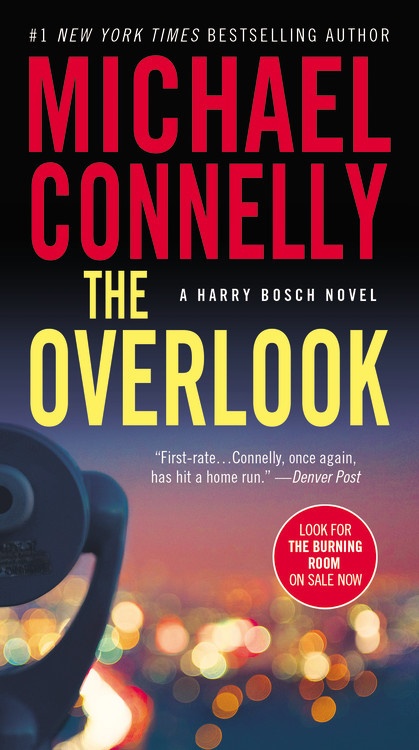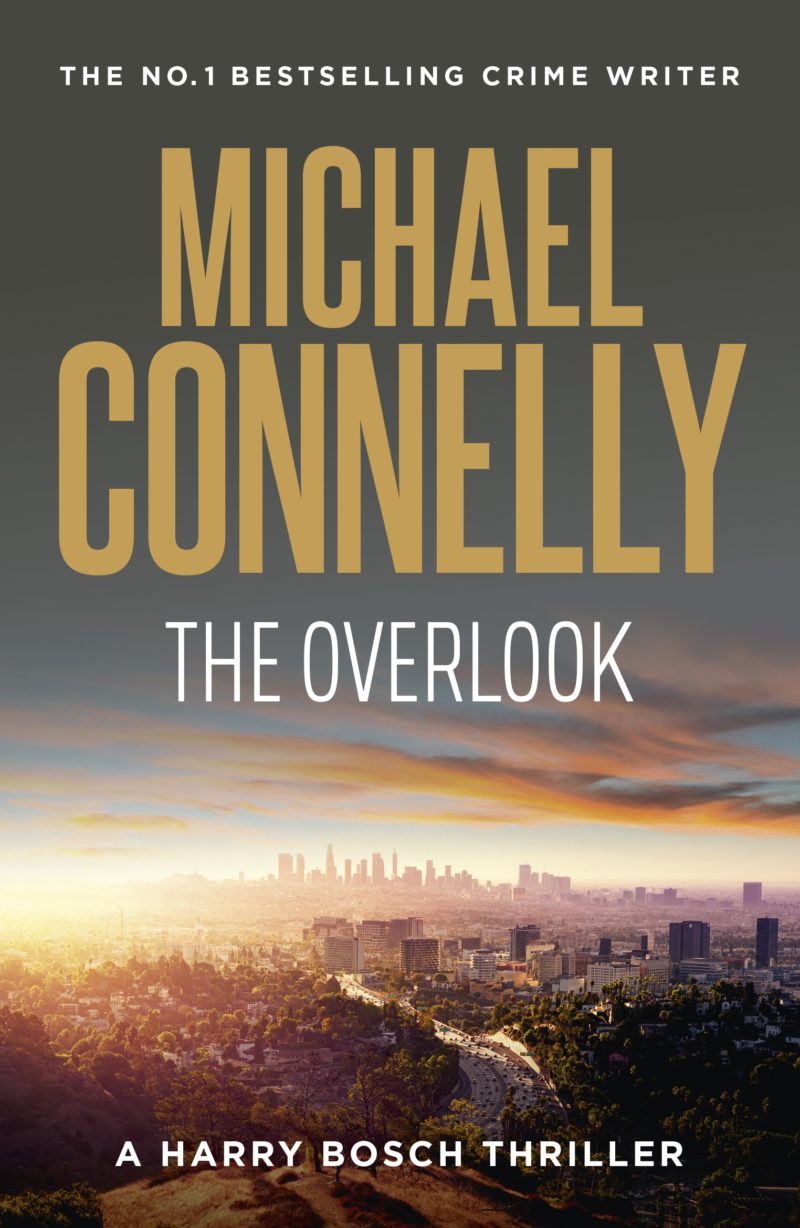The Overlook Excerpt
An Excerpt From Chapter One
The call came at midnight. Harry Bosch was awake and sitting in the living room in the dark. He liked to think that he was doing this because it allowed him to hear the saxophone better. By masking one of the senses he accentuated another.
But deep down he knew the truth. He was waiting.
The call was from Larry Gandle, his supervisor in Homicide Special. It was Bosch’s first call out in the new job. And it was what he had been waiting for.
“Harry, you up?”
“I’m up.”
“Who’s that you got playing?”
“Frank Morgan, live at the Jazz Standard in New York. That’s George Cables you’re hearing now on piano.”
“Sounds like All Blues.”
“You nailed it.”
“Good stuff. I hate to take you away from it.”
Bosch used the remote to turn the music off.
“What’s the call, Lieutenant?”
“Hollywood wants you and Iggy to come out and take over a case. They’ve already caught three today and can’t handle a fourth. This one also looks like it might become a hobby. It looks like an execution.”
The Los Angeles Police Department had seventeen geographic divisions, each with its own station and detective bureau, including a homicide squad. But the divisional squads were the first line and couldn’t get bogged down on long-running cases. Whenever a murder came with any sort of political, celebrity or media attachment, it was usually shuttled down to Homicide Special, which operated out of the Robbery-Homicide Division in Parker Center. Any case that appeared to be particularly difficult and time consuming—that would invariably stay active like a hobby—would also be an immediate candidate for Homicide Special. This was one of those.
“Where is it?” Bosch asked.
“Up on that overlook above the Mulholland Dam. You know the place?”
“Yeah, I’ve been up there.”
Bosch got up and walked to the dining room table. He opened a drawer designed for silverware and took out a pen and a small notebook. On the first page of the notebook he wrote down the date and the location of the murder scene.
“Any other details I should know?” Bosch asked.
“Not a lot,” Gandle said. “Like I said, it was described to me as an execution. Two in the back of the head. Somebody took this guy up there and blew his brains out all over that pretty view.”
Bosch let this register a moment before asking the next question.
“Do they know who the dead guy is?”
“The divisionals are working on it. Maybe they’ll have something by the time you get over there. It’s practically in your neighborhood, right?”
“Not too far.”
Gandle gave Bosch more specifics on the location of the crime scene and asked if Harry would make the next call out to his partner. Bosch said he would take care of it.
“Okay, Harry, get out there and see what’s what, then call me and let me know. Just wake me up. Everybody else does.”
Bosch thought it was just like a supervisor to complain about getting woken up to a person he would routinely wake up over the course of their relationship.
“You got it,” Bosch said.
Bosch hung up and immediately called Ignacio Ferras, his new partner. They were still feeling their way. Ferras was more than twenty years younger and from another culture. The bonding would happen, Bosch was sure, but it would come slowly. It always did.
Ferras was awakened by Bosch’s call but became alert quickly and seemed eager to respond, which was good. The only problem was that he lived all the way out in Diamond Bar, which would put his ETA at the crime scene at least an hour off. Bosch had talked to him about it the first day they had been assigned as partners but Ferras wasn’t interested in moving. He had a family support system in Diamond Bar and wanted to keep it.
Bosch knew that he would get to the crime scene well ahead of Ferras and that would mean he would have to handle any divisional friction on his own. Taking a case away from the divisional squad was always a delicate thing. It was a decision usually made by supervisors, not the homicide detectives on the scene. Any homicide detective worth the gold trim on his badge would never want to give away a case. That just wasn’t part of the mission.
“See you there, Ignacio,” Bosch said.
“Harry,” Ferras said, “I told you. Call me Iggy. Everybody does.”
Bosch said nothing. He didn’t want to call him Iggy. He didn’t think it was a name that matched the weight of the assignment and mission. He wished that his partner would come to that realization and then stop asking him.
Bosch thought of something and added an instruction, telling Ferras to swing by Parker Center on his way in and sign out a car for them to use. It would add minutes to his arrival time but Bosch planned to drive his own car to the scene and he knew he was low on gas.
“Okay, see you there,” Bosch said, leaving names out.
He hung up and grabbed his coat out of the closet by the front door. As he put his arms into it he glanced at himself in the mirror on the inside of the door. At 56 years old he was trim and fit and could even stand to add a few pounds while other detectives his age were getting round in the middle. In Homicide Special there was a pair of detectives known as Crate and Barrel because of their widening dimensions. Bosch didn’t have to worry about that.
The gray had not yet chased all of the brown out of his hair but it was getting close to victory. His dark eyes were clear and bright and ready for the challenge awaiting him at the overlook. In his own eyes Bosch saw a basic understanding of homicide work, that when he stepped out the front door he would be willing and able to go the distance—whatever that entailed—to get the job done. It made him feel as though he was bulletproof.
He reached across his body with his left hand to pull the gun out of the holster on his right hip. It was a Kimber Ultra Carry. He quickly checked the magazine and the action and then returned the weapon to its holster.
He was ready. He opened the door.
An Excerpt From Chapter Three
Following the walk-through he stood in the backyard looking up at the Hollywood sign and calling central communications again to ask that a second forensics team be dispatched to process the Kent house. He also checked on the ETA of the paramedics coming to examine Alicia Kent and was told that they were still five minutes away. This was ten minutes after he had been told that they were ten minutes away.
Next he called Lt. Gandle, waking him at his home. His supervisor listened quietly as Bosch updated him. The federal involvement and the rising possibility of a terrorism angle to the investigation gave Gandle pause.
“Well . . .,” he said when Bosch was finished. “It looks like I am going to have to wake some people up.”
He meant he was going to have to send word of the case and the larger dimensions it was taking on up the department ladder. The last thing an RHD lieutenant would want or need would be to get called into the OCP—the office of the chief of police—in the morning and asked why he hadn’t alerted command staff to the case and its growing implications earlier. Bosch knew that Gandle would now act to protect himself as well as to seek direction from above. This was fine with Bosch and expected. But it gave him pause as well. The LAPD had its own Office of Homeland Security. It was commanded by a man most people in the department viewed as a loose cannon who was unqualified and unsuited for the job.
“Is one of those wake ups going to Captain Hadley?” Bosch asked.
Captain Don Hadley was the twin brother of James Hadley, who happened to be a member of the Police Commission, the politically appointed panel with LAPD oversight and authority to appoint and retain the Chief of Police. Less than a year after James Hadley was placed on the commission by mayoral appointment and the approval of the city council his twin brother jumped from being second in command of the Valley Traffic Division to being commander of the newly formed Office of Homeland Security. This was seen at the time as a political move by the then chief of police who was desperately trying to keep his job. It didn’t work. He was fired and a new chief appointed. But in the transition Hadley kept his job commanding the OHS.
The mission of the OHS was to interface with federal agencies and maintain a flow of intelligence data. In the last six years Los Angeles had been targeted by terrorists at least two times that were known. In each incident the LAPD found out about the threat after it had been foiled by the feds. This was embarrassing to the department and the OHS had been formed so that the LAPD could make intelligence inroads and eventually know what the federal government knew about its own backyard.
The problem was that in practice it was largely suspected that the LAPD remained shut out by the feds. And in order to hide this failing and to justify his position and unit, Captain Hadley had taken to holding grandstanding press conferences and showing up with his black-clad OHS unit at any crime scene where there was a remote possibility of terrorist involvement. An overturned tanker truck on the Hollywood Freeway brought the OHS out in force, until it was determined that the tanker was carrying milk. A shooting of a rabbi at a temple in Westwood brought the same response until the incident was determined to have been the product of a love triangle.
And so it went. After about the fourth misfire, the commander of the OHS was baptized with a new name among the rank and file. Captain Don Hadley became known as Captain Done Badly. But he remained in his position, thanks to the thin veil of politics that hung over his appointment. The last Bosch had heard about Hadley on the department grapevine was that he had put his entire squad back into the academy for training in urban assault tactics.
“I don’t know about Hadley,” Gandle said in response to Bosch. “He’ll probably be looped in. I’ll start with my captain and he’ll make the call on who gets the word from there. But that’s not your concern, Harry. You do your job and don’t worry about Hadley. The people you have to watch your back with are the feds.”
“Got it.”
“Remember, with the feds it’s always time to worry when they start telling you just want you want to hear.”
Bosch nodded. The advice followed a time honored LAPD tradition of distrusting the FBI. And, of course, it was a tradition honored for just as long by the FBI in terms of distrusting the LAPD right back. It was the reason the OHS was born.
When Bosch came back into the house he found Walling on her cell phone and a man he had never seen before standing in the living room. He was tall, mid-40s and exuded that undeniable FBI confidence Bosch had seen many times before. The man put out his hand.
“You must be Detective Bosch,” he said. “Jack Brenner. Rachel’s my partner.”
Bosch shook his hand. It was a small thing but the way he said Rachel was his partner told Bosch a lot. There was something proprietary about it. Brenner was telling him that the senior partner was now on the job, whether that would be Rachel’s view of it or not.
“So, you two have met.”
Bosch turned. Walling was off the phone now.
“Sorry,” she said. “I was filling in the special agent in charge. He’s decided to devote all of Tactical to it. He’s running out three teams to start hitting the hospitals to see if Kent has been in any of the hot labs today.”
“The hot lab is where they keep the radioactive stuff?” Bosch asked.
“Yes. Kent had access through security to just about all of them in the county. We have to figure out if he was inside any of them today.”
Bosch knew that he could probably narrow the search down to one medical facility. Saint Agatha’s Clinic for Women. Kent was wearing an ID tag from the hospital when he was murdered. Walling and Brenner didn’t know that but Bosch decided not to tell them yet. He sensed the investigation was moving away from him and he wanted to hold on to what might be the one piece of inside information he still had.
“What about the LAPD?” he asked instead.
“The LAPD?” Brenner said, jumping on the question ahead of Walling. “You mean what about you, Bosch? Is that what you’re asking?”
“Yeah, that’s right. Where do I stand in this?”
Brenner spread his arms in a gesture of openness.
“Don’t worry, you’re in. You’re with us all the way.”
The federal agent nodded like it was a promise as good as gold.
“Good,” Bosch said. “That’s just want I wanted to hear.”
He looked at Walling for confirmation of her partner’s statement. But she looked away.


